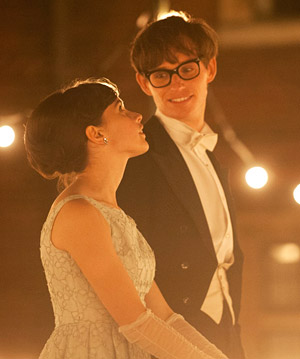
Benedict Cumberbatch, left, portrays Alan Turing in The Imitation Game (Image: STUDIOCANAL); Eddie Redmayne, right, stars as Stephen Hawking in The Theory of Everything (Image: Liam Daniel / Focus Features)
A review of two new movies: the Stephen Hawking biography The Theory of Everything, and the Alan Turing biography The Imitation Game.
2014 has been a relatively good year for science in the public eye. At the beginning of the year, we had Bill Nye’s victory over creationist Ken Ham, and two outstanding TV series, Neil DeGrasse Tyson’s Cosmos, and Neil Shubin’s Your Inner Fish. In all three cases, leading American popularizers of science managed to get a lot of publicity for good science. They also were successful in striking blows against various forms of pseudoscience, which are still pervasive in the media (especially on basic cable channels like Discovery and TLC, which ran “fake-umentaries” this year about living gigantic sharks, living mermaids, killer yetis, and even a guy promising to let an anaconda swallow him—then reneging). Now the year is coming to an end with two outstanding biopics about two of the most brilliant British mathematicians and scientists of the mid-late twentieth century, cosmologist Stephen Hawking (The Theory of Everything), and mathematician/cryptanalyst/computer pioneer Alan Turing (The Imitation Game). In both cases, the movies are outstanding, not only in their acting, writing, directing, and cinematography, but especially their relatively accurate and sympathetic portrayal of science and scientists, with all its struggles and triumphs.
Hawking’s Story

Felicity Jones stars as Jane Wilde and Eddie Redmayne stars as Stephen Hawking in Academy Award winner James Marsh’s The Theory of Everything, a Focus Features release. (Image: Liam Daniel / Focus Features)
The Hawking biopic, The Theory of Everything, focuses mostly on the early part of Hawking’s life, when he went from an awkward but brilliant mathematician and physicist who was still physically fit, to the gradual deterioration of his body due to the effects of ALS (amyotrophic lateral sclerosis, also known as Lou Gehrig’s disease after the famous New York Yankee who died from it). We see his early beginnings as a brilliant but socially awkward and isolated youth who quickly discovers his enormous talent for maths and physics. He is earning his doctorate when the first symptoms strike. He manages to woo his wife Jane before he becomes an invalid, and most of the movie is devoted to his deteriorating condition, and the huge burden it placed on his wife and family. Your heart goes out to this genius imprisoned by paralysis, and you find yourself trying to reach out and help him as he becomes more and more helpless. He eventually becomes unable to communicate the brilliant ideas that were running through his head until a voice synthesizer and computer are fitted to his wheelchair. The script is a bit light on the scientific side of the story, and I would like to have seen a bit more explanation of what kind of science they were pioneering and why it was so significant, but that is to be expected for a movie that is aimed at a popular audience which assumes no knowledge of science. (Tyson’s Cosmos, by contrast, managed to explain a lot of science without losing the same audience). The movie ends on a positive note, with Hawking receiving honors from the Queen herself, and reconciled with Jane after their divorce, even as he is reduced to controlling his wheelchair and his voice synthesizer by his eye muscles.
Turing’s Tale
The Turing movie, The Imitation Game, on the other hand, is very different in tone. Turing was another isolated genius, always the smartest person in the room—and never afraid to say it. Turing was not affected by ALS, but had a different problem: autism-spectrum disorder (ASD), which made him socially inept, unable to read people or understand subtle verbal cues or a joke, and constantly saying things bluntly and offending people without intending to. As someone who knows a lot of ASD people, I was tremendously moved by his predicament, and recognized all the same behaviors that are familiar to most of us today. Back in the 1920s and 1930s, ASD was not diagnosed, and he was just an “odd duck” and people laughed at him and insulted him to his face. Luckily, Turing was probably one of the most brilliant minds of his generation, and soon developed talents not only for mathematics, but also for puzzles and eventually cryptography. More importantly, his brilliance became essential as the British government recruited him to break the unbreakable codes of the Enigma cipher machines used by Nazi Germany during World War II. Despite the scorn of his co-workers and superiors, he eventually triumphs in inventing a machine that could decipher the German coded communications in minutes. As Winston Churchill and others have noted, this became essential to the survival of Britain and eventually helped win the war two years earlier than it might have, and saved millions of lives.

Benedict Cumberbatch (Alan Turing) in The Imitation Game (Image: STUDIOCANAL);
Unlike Hawking’s story, the Turing movie is not a triumph, but a tragedy. After the war ended, Turing continued his pioneering work on the first true computers (which he had theorized and published about before the war). Then he became entangled in problems due to his homosexuality. Any hint of homosexual behavior was a crime in Britain in those days, so he is forced to undergo the torture of chemical sterilization (injections of synthetic estrogen) to kill his sex drive—and destroy his persona. In 1954, at the young age of 41, Turing apparently committed suicide by eating an apple he had laced with cyanide. Thus, British laws against gays killed one of their greatest minds, the man who is now considered the father of the computer and the first to seriously consider the idea of artificial intelligence. Today, Turing is revered by computer scientists all over the world, but thanks to the top-secret nature of the work he did, only a few knew of his genius or accomplishments while he lived, and much of his work remained unknown until the 1970s.
Art and History
As Andrew Hodges, author of the Turing biography on which the film was based, pointed out at his Dec. 7 talk to the Skeptic Society, the film does take a lot of liberties with the actual events in Turing’s life. Many scenes are fictional and imagined, especially since a lot of what they did in the code-breaking complex at Bletchley Park was top secret, and most written records have been lost. The role of Joan Clarke, the brilliant mathematician who worked with the mostly male Enigma code breakers, is greatly exaggerated to provide a more sympathetic character to the film. Portrayed in the film by Keira Knightley, the real Clarke herself suffered a different form of discrimination, since (despite her talent) women were not allowed into the hallowed halls of higher mathematics in those days. She could never obtain an academic position, and had to escape the typing pool and work with the code breakers at Bletchley Park only by subterfuge.
But the most outstanding feature of both films is the performances by their lead actors. Hawking is played by Eddie Redmayne, familiar as the handsome young Marius in the film version of Les Miserables. But Redmayne completely transforms his appearance from the gawky boyish academic in the early part of the movie to the withered, shrunken adult Hawking stuck in a wheelchair, literally unable to move a muscle. The transformation is even more remarkable when you realize that it involves almost no makeup, prosthetics, or CG trickery, but just Redmayne’s amazing physical gifts. Turing is played by the brilliant, versatile Benedict Cumberbatch, familiar from many roles from the slavemaster in 12 Years a Slave to the voice of Smaug the Dragon in the Hobbit series. Cumberbatch perfectly captures the hallmarks of autism: the tilted head, the speech patterns, the stammer, the eye movements, the stiff body movements, and the general social awkwardness that comes from ASD. Expect both of them to be nominated for Oscars come awards season.
After years of Hollywood portrayals of “mad scientists” as evil geniuses plotting to rule the world, we suddenly get two movies about scientific and mathematical geniuses who are sympathetic characters. Of course, Hollywood being Hollywood, the only way that they think that we in the audience can relate to their humanity is to have the main character dealing with physical handicaps (ASD or ALS), which overshadows the important and brilliant work that they did. I’m sure glad to see these outstanding scientific biopics on the screen, but maybe for once could we have a movie about a brilliant scientist who does not have to overcome severe physical handicaps, and still be a sympathetic character?